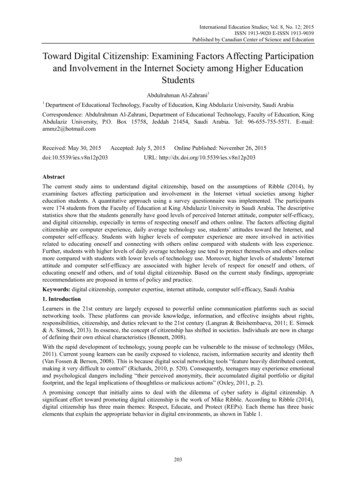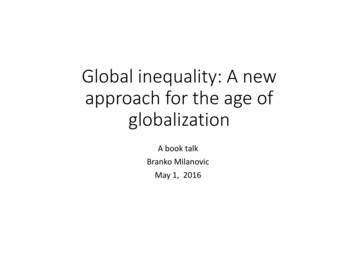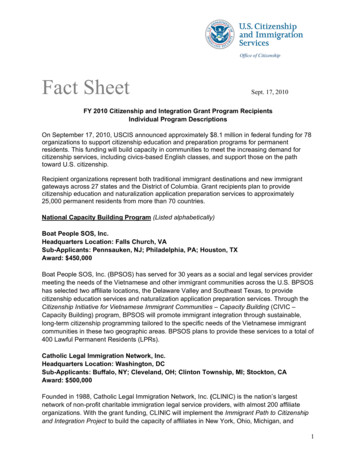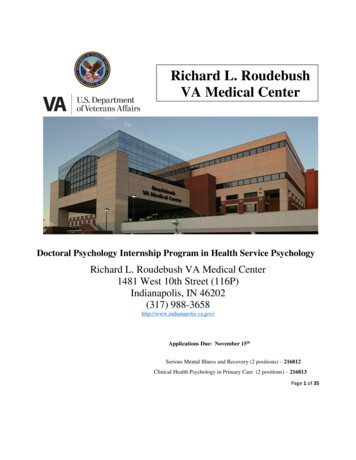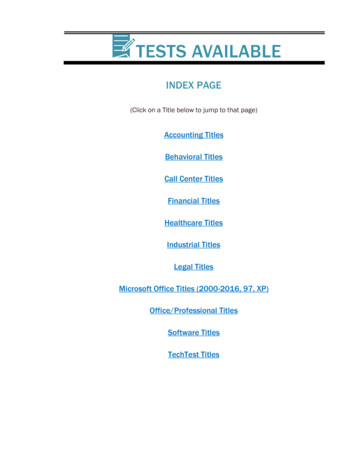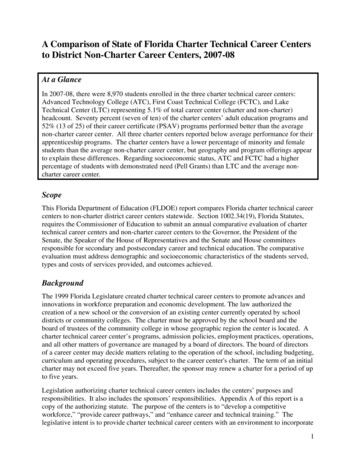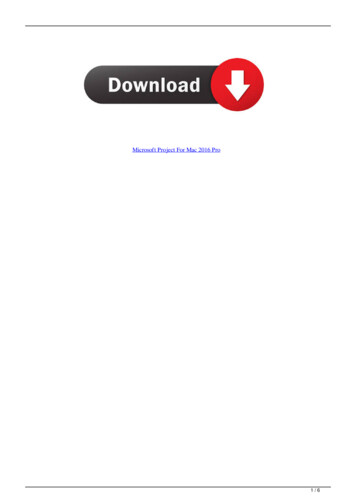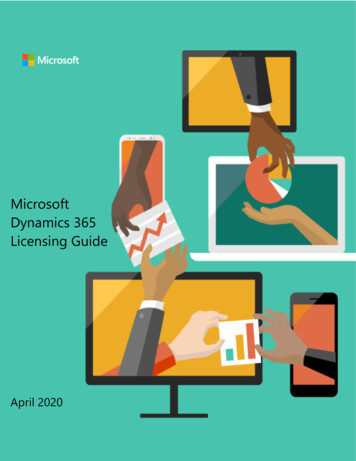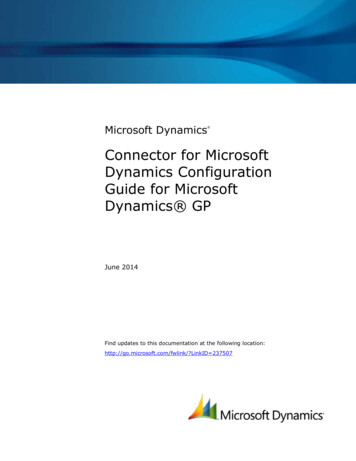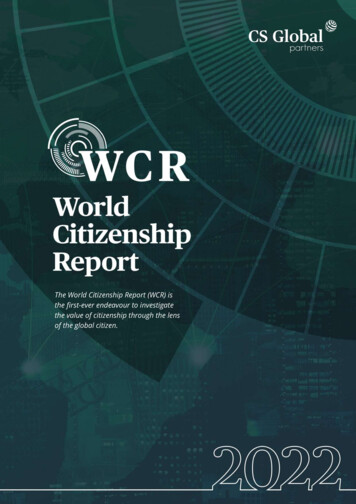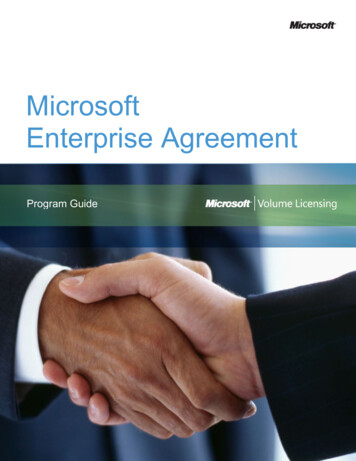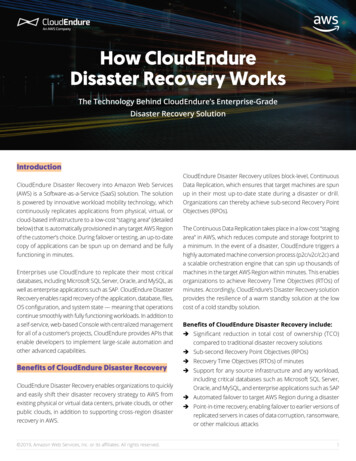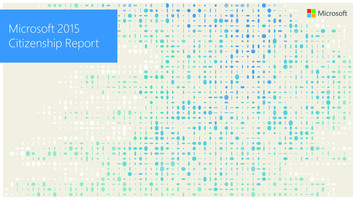
Transcription
Microsoft 2015Citizenship Report
Letter from Our CEOOver the past year at Microsoft, we’ve challengedourselves to rediscover what it is about the core ofour company that really matters. How can we makea difference in this world in a way that no othercompany can? We’ve begun by embracing a newmission: to empower every person and every organization on the planet to achieve more. To achieveour mission, we’ve defined business ambitionsthat are equally bold: to reinvent productivity andbusiness processes, to build the intelligent cloudplatform, and to create more personal computing.The true test of the difference we make is theimpact we have on people’s lives. This is why I traveled to Nanyuki, Kenya, to celebrate the launch ofWindows 10. Nestled in the foothills of Mt. Kenya,125 miles north of Nairobi, Nanyuki is a placewhere sending an email or accessing the Web inthe past required a five-hour walk to the nearestwireless hotspot. Now, an innovative technologydeveloped by Microsoft researchers, one that takesadvantage of underutilized television broadcastspectrum, is helping to provide low-cost Internetaccess to the residents of Nanyuki. In the novel “TheFlame Trees of Thika” set among these same foothills, Elspeth Huxley writes that “when the presentstung her, she sought her antidote in the future.”Microsoft 2015 Citizenship ReportThat future is now brighter. This fall, I visited LatinAmerica to learn how technology is being used toempower people and businesses across the region.In Toluca, Mexico, just outside Mexico City, I sawthis firsthand at a YouthSpark-POETA center thatoffers people from underrepresented backgroundsaccess to digital literacy, computer science trainingand mentoring, and resources to seek employmentand entrepreneurship opportunities. I met withstudents and young entrepreneurs who had beeninspired to start their own businesses, and in turnapply those learnings to teach others, and it was aprofound reminder of the impact we can havein the world.This report summarizes our work during fiscal year2015 to meet the high expectations that we havefor ourselves and that our customers, communities and other stakeholders have for us. Highlightsinclude our efforts to address climate changethrough an industry-leading internal carbon feeand new policies designed to ensure that our U.S.suppliers provide paid leave to their employeeswho handle our work. In addition, in FY15, we mademore than 922 million in technology donations tomore than 120,000 nonprofit organizations globally,and Microsoft employees contributed 117 millionto nearly 20,000 nonprofits through our corporategiving campaign.To really make a difference, it’s not enough tobuild great products and services. Living up to ourmission also depends on how well we apply ourtechnology, talent and financial resources to fosteropportunity and serve the needs of communitiesaround the globe where our employees, partnersand customers live. We recognize that our abilityto pursue these goals requires that we conductour business with integrity, with respect for humanrights, and in ways that promote environmentalsustainability.We’re particularly proud of our efforts to increaseaccess to education and opportunity for youngpeople. This year we surpassed the three-yeargoal for our YouthSpark initiative by creatingopportunities for education, employment andentrepreneurship for 307 million youth worldwide.Over the next three years we are committing 75million to the next generation of our YouthSparkinitiative to increase access to computer scienceeducation for all youth worldwide, especially thosefrom under-represented backgrounds.As I’ve shared with Microsoft employees, I believewe can do amazing things when we come togetherwith a clear mission and a culture that bringsout the best in us as individuals and collectively.Microsoft’s citizenship commitments help usensure that what we accomplish together not onlyadvances our business but also ultimately increasesthe positive impact we have in places like Nanyukiand Toluca and everywhere we do business aroundthe world.Sincerely,Satya NadellaChief Executive Officer
ContentsFY151Select Performance HighlightsOur Company35Our BusinessCitizenship GovernanceStakeholder Engagement2Our PeopleOur ApproachOur ApproachEnvironmentalSustainabilityCompensation and BenefitsPrivacy and Data SecurityOur ApproachGlobal Diversity and InclusionGlobal Network InitiativeProductsTraining and DevelopmentWorking to Protect the Rightsof Vulnerable PopulationsOur Business PracticesAccessible TechnologyPartnershipsFY15 Progress and FY16 GoalsFY15 Progress and FY16 Goals20Citizenship Materiality AssessmentEmployee Wellness and OccupationalHealth and SafetyAbout This ReportFY15 Progress and FY16 GoalsHuman Rights39Our ApproachOur ApproachMicrosoft YouthSparkOur ApproachCommitment to Ethics andStandards of Business ConductTechnology for GoodSocial and Environmental Accountabilityin Our Device and Supply Chain GroupCorporate GovernancePublic Policy EngagementFY15 Progress and FY16 GoalsMicrosoft 2015 Citizenship Report41231Humanitarian and Disaster ResponseEmployee Giving and VolunteerismFY15 Progress and FY16 Goals647Responsible Sourcing of Raw MaterialsResponsible Sourcing WithIndirect SuppliersFY15 Progress and FY16 Goals7Water and WasteResponsible Sourcingand ManufacturingEthical Business Conductand GovernanceEmpowering Communities558
FY15Select Performance HighlightsEthical Business Conductand GovernanceEmpowering CommunitiesMore than 99 percent of Microsoft employees completedannual training on our Standards of Business Conduct,which is available globally in 19 languages.Microsoft’s total annual giving surpassed 1 billion for thesecond year in a row, with cash donations of 135 million andin-kind donations worth 922 million.Our PeopleWe surpassed the 3-year goal for our YouthSpark initiativeby creating opportunities for education, employment, andentrepreneurship for 307 million youth worldwide.Eighty-four percent of employees polled said they wouldrecommend Microsoft as a great place to work.Human RightsThe percentage of minorities in our global workforce grewfrom 39 to 41 percent and the percentage of Microsoftsenior executive women and minorities increased from27 to 30 percent.Microsoft maintained our active membership in theGlobal Network Initiative, a collaborative effort regardingpractical steps and policies technology and communicationcompanies can adopt to respect and advance the freedomof expression and privacy rights of their users when facedwith government demands. We were also the first majorcloud provider to gain independent verification for meetingthe world’s first international standard for cloud privacy.Responsible Sourcingand ManufacturingIn FY14, we completed 314 third-party audits and Microsoftassessments of 138 Tier 1 and high- and medium-risk Tier2 hardware suppliers. Critical/serious nonconformancefindings are detailed in this report. In all of these instances,the suppliers instituted corrective action plans that wereapproved by Microsoft, and follow-up audits confirmed thatthe suppliers were implementing the corrective action plans.Environmental SustainabilityWe met our carbon neutrality commitment throughinternal efficiency projects, the purchase of more than3 billion kilowatt hours (kWh) of renewable energy(equal to 100 percent of our global electricity use), anda carbon offset project portfolio representing more than600,000 metric tons of carbon dioxide (CO2) emissions.We continued to expand our work with our hardwaresuppliers to build their capabilities on environmental healthand safety management and to improve factory workers’living environments.We also continued to enhance our work to advanceresponsible sourcing with our non-hardware suppliers,including new policies designed to ensure that our U.S.suppliers provide paid leave to their employees whohandle our work.In working to protect the rights of vulnerable populations,we launched a free cloud-based version of PhotoDNA,to further increase access to this technology used to helpidentify and remove child sexual abuse images fromthe Internet.Microsoft 2015 Citizenship Report4
PerformanceHighlightsOur CompanyEthical BusinessConduct andGovernanceOur PeopleEmpoweringCommunitiesOur CompanyMicrosoft 2015 Citizenship ReportHuman RightsResponsibleSourcing andManufacturingEnvironmentalSustainability11.1Our Business1.2Citizenship Governance1.3Stakeholder Engagement1.4Citizenship Materiality Assessment1.5About This Report5
PerformanceHighlights1.1Our CompanyEthical BusinessConduct andGovernanceOur PeopleEmpoweringCommunitiesHuman RightsResponsibleSourcing andManufacturingEnvironmentalSustainabilityOur BusinessMicrosoft is a technology company whose mission is to empower every person andevery organization on the planet to achieve more. Our strategy is to build best-inclass platforms and productivity services for a mobile-first, cloud-first world.Founded in 1975, we operate worldwide and have offices in more than 100countries. We develop, license, and support a wide range of software products,services, and devices that deliver new opportunities, greater convenience, andenhanced value to people’s lives. We offer an array of services, including cloudbased services, to consumers and businesses. We design, manufacture, and selldevices that integrate with our cloud-based services, and we deliver relevantonline advertising to a global audience.Our products include operating systems forcomputing devices, servers, phones, and otherintelligent devices; server applications for distributed computing environments; cross-deviceproductivity applications; business solutionapplications; desktop and server managementtools; software development tools; video games;and online advertising. We also design and sellhardware including PCs, tablets, gaming andentertainment consoles, phones, other intelligentdevices, and related accessories. We offer cloudbased solutions that provide customers withMicrosoft 2015 Citizenship Reportsoftware, services, platforms, and content.We also provide consulting and product andsolution support services, and we train and certifycomputer system integrators and developers.As of June 30, 2015, we employed approximately118,000 people on a full-time basis, 60,000 in theUnited States and 58,000 internationally. Of thetotal employed people, 39,000 were in productresearch and development, 29,000 in salesand marketing, 32,000 in product support andconsulting services, 8,000 in manufacturing anddistribution, and 10,000 in general and administration. We develop most of our products and servicesinternally through three engineering groups. The Applications and Services EngineeringGroup focuses on broad applications andservices core technologies in productivity,communication, education, search, and otherinformation categories. The Cloud and Enterprise EngineeringGroup focuses on development of our cloudinfrastructure, server, database, customerrelationship management (CRM), enterpriseresource planning (ERP), management,development tools, and other business processapplications and services for enterprises. The Windows and Devices Engineering Groupfocuses on our Windows platform acrossdevices of all types, hardware development ofour devices—including Xbox consoles, Surfacedevices, Lumia phones, non-Lumia phones,Surface Hub, Microsoft Band, and otherhardware products and accessories—and associated online marketplaces.During FY15, our research and developmentexpense was US 12.0 billion, 13 percent ofrevenue. To carry out our strategy, our researchand development efforts focus on three interconnected ambitions: Reinvent productivity and business processes. Build the intelligent cloud platform. Create more personal computing.In addition to our main research and developmentoperations, we also operate Microsoft Research.Microsoft Research is one of the world’s largestcomputer science research organizations, andworks in close collaboration with top universitiesaround the world to advance the state of the artin computer science, providing us a uniqueperspective on future technology trends andcontributing to our innovation.Detailed, updated information about Microsoft’sbusiness, operations, and workforce isavailable here.6
PerformanceHighlights1.2Our CompanyEthical BusinessConduct andGovernanceOur PeopleEmpoweringCommunitiesHuman RightsResponsibleSourcing ship GovernanceMicrosoft’s citizenship mission is to serve globally the needs of communities and tofulfill our responsibilities to the public. In doing so, we seek to apply the power ofour corporate policies and business practices, our products, and our investments incommunities to advance our company mission to empower every person and everyorganization on the planet to achieve more.The charter for the Regulatory and Public Policy Committee of our Boardof Directors includes the responsibility to “review and provide guidance to theboard and management about the company’s policies and programs that relateto corporate citizenship, including human rights, environmental sustainability,corporate social responsibility, supply chain management, charitable giving, andpolitical activities and expenditures.” It does so on a semi-annual basis.Microsoft 2015 Citizenship ReportMicrosoft’s Citizenship and Public Affairs teamsits within our Legal and Corporate Affairs Groupand drives initiatives and engages with groupsacross Microsoft to help the company fulfill itsresponsibilities as a global corporate citizenand deliver added value to the company andits stakeholders. This team of 30 professionalsdevelops our global citizenship strategies andworks in partnership with local Microsoft citizenship and corporate affairs professionals aroundthe world to advance our citizenship commitmentswherever we do business. The General Managerof Citizenship and Public Affairs reports directly toMicrosoft’s Executive Vice President and GeneralCounsel, who sits on CEO Satya Nadella’s SeniorLeadership Team.More broadly, citizenship at Microsoft relieson the combined efforts of all our employees,including colleagues in dozens of other leadership roles, business and operational groups, andglobal subsidiaries. Together, they help identifyemerging issues and societal challenges whereMicrosoft can add the greatest value, developand implement new strategies and programs,and monitor our progress.7
PerformanceHighlights1.3Our CompanyEthical BusinessConduct andGovernanceOur PeopleEmpoweringCommunitiesHuman RightsResponsibleSourcing lder EngagementStakeholder Engagement OverviewTo inform our decisions, we regularly communicate with thousands ofstakeholders globally ranging from parents concerned about their child’s onlinesafety to international human rights experts. These engagements take many forms.Employees from our business and operationalgroups regularly identify and engage with stakeholders in the course of their daily work activities.Our Citizenship and Public Affairs team alsomanages a number of stakeholder relationshipsand ongoing dialogues to help inform and guideour strategies. We connect with leading thinkerson corporate responsibility and societal challengesin groups such as Business for Social Responsibility,CSR Europe, and the World Economic Forum.Microsoft 2015 Citizenship ReportWe learn from them and other advocacy groups,socially responsible investors, corporate responsibility rating agencies, other external stakeholders,and our own employees to identify new andemerging citizenship issues. We also base ourwork on international frameworks such as theUnited Nations Global Compact, the UN GuidingPrinciples on Business and Human Rights, andthe Global Reporting Initiatives’ SustainabilityReporting Guidelines.Stakeholder GroupsExamples of EngagementSelected ResultsCustomersWe gain insights from online feedback, supportcommunities, product satisfaction surveys, usabilitystudies, research forums, business account managers, and our customer service representatives.Customer feedback and insights underlie allof our decisions to enhance existing productsand develop new ones. In FY15, the WindowsInsider program reached 5 million customersto allow them to preview Windows 10 andprovide feedback, which helped shape keyfeatures of the product. Customer feedbackalso plays an important role in helping usdevelop clearer and more customer-friendlycontracts and terms of use policies.Stakeholder GroupsExamples of EngagementSelected ResultsInvestorsBeyond traditional investor communications such asearnings calls and our annual meeting, we seek toproactively provide investors with corporate governance information through diverse communications,including a director video interview series and directcommunications from independent members ofour board to shareholders. We proactively reach outto institutional investors—including public pensionfunds and socially responsible investors—aboutgovernance and citizenship-related topics, anddeliver a summary of their feedback to the board. InFY15, these engagements reached investors holdingover 40 percent of our outstanding shares. Weseek to transparently provide information soughtby socially responsible investors and corporateresponsibility rating agencies and seek their insightsto identify new and emerging citizenship issues.Our engagement with investors hasinfluenced many important parts of ourcitizenship strategy, such as our humanrights commitments under the GlobalNetwork Initiative, a collaborative effortbetween information and communicationstechnology (ICT) companies, human rightsgroups, socially responsible investors, andothers. Investors are an important influenceas we continue to consider ways to enhanceour corporate governance principlesand policies to serve the interests of ourshareholders and other stakeholders.8
PerformanceHighlights1.3Our CompanyEthical BusinessConduct andGovernanceOur PeopleEmpoweringCommunitiesHuman RightsResponsibleSourcing lder EngagementStakeholder Engagement OverviewStakeholder Engagement OverviewStakeholder GroupsExamples of EngagementSelected ResultsStakeholder GroupsExamples of EngagementSelected ResultsEmployeesWe ask for—and act on—employee feedback inmultiple ways, including conducting an annual onlineanonymous poll of all our employees around theworld. The poll, with a nearly 85 percent response rate,asks employees to share feedback about the Microsoftwork experience, including how they feel about theirworkgroups, organization, and company as a whole.Microsoft offers employees, customers, suppliers,and other external parties multiple ways to reportcompliance concerns as described in our EthicalBusiness Conduct and Governance chapter.Microsoft’s Senior Leadership Teamand individual managers use the pollresults to further improve on areas ofstrength and address opportunitiesfor improvement.Industry coalitionsand public-privatepartnershipsMicrosoft actively participates in industry coalitions toaddress important citizenship issues and in many casesis among the leaders bringing companies together towork collaboratively to solve challenges.Microsoft has helped establishgroups that help set the standardfor responsible business practices inthe ICT industry, ranging from theElectronics Industry CitizenshipCoalition and Global Network Initiativeto the International Association ofAccessibility Professionals.Civil society /nongovernmentalorganizations (NGOs)We engage with suppliers through capacity-buildingworkshops and trainings, supplier advisory boards,hosting an annual supplier summit, and participationin industry coalitions, such as the Electronics IndustryCitizenship Coalition. We also conduct anonymousVoice of the Supplier Surveys, which include questionson citizenship issues.Our work to address environmentaland social issues in collaborationwith our suppliers is detailed in theResponsible Sourcing chapter.Across the breadth of our business, we engagewith thousands of NGOs working on issues rangingfrom environmental sustainability to employeediversity to child safety.Virtually all of the initiatives describedthroughout this Citizenship Reporthave benefitted from insights providedby NGOs and in many cases involveactive ongoing partnerships with them.PolicymakersMicrosoft is recognized as a leaderfor policies that help to ensure theaccountability and transparencyof our engagement in the publicpolicy process.Microsoft’s local citizenship teams work directly withcommunity groups and in partnerships with local nonprofits. They share views and insights from local communities with Microsoft’s global Citizenship and PublicAffairs team in direct communications, through regularconference calls, and at an annual global summit.Microsoft’s YouthSpark Initiative andOffice 365 for Nonprofits programwere both strongly shaped by inputfrom local communities about thebest way to serve economic and socialneeds in their area.Microsoft engages actively in policy issues relevantto our business, both directly and through industryassociations. We seek to ensure that our participationin the political process takes place in the light of dayand for reasons that are clear and justifiable to ourshareholders and the public.SuppliersCommunitiesMicrosoft 2015 Citizenship Report9
PerformanceHighlights1.4Our CompanyEthical BusinessConduct andGovernanceOur PeopleEmpoweringCommunitiesHuman RightsResponsibleSourcing ship Materiality AssessmentTo apply the Global Reporting Initiative’s G4 Sustainability Reporting Guidelines toour citizenship materiality assessment, we follow the common practice of definingour most significant citizenship issues as those ranking highest both in businessimportance to Microsoft and in importance to our key stakeholders.This aligns with how we set our citizenshipstrategies and commitments to drive bothpositive impacts to our business and to society.Citizenship Materiality Assessment: Top IssuesFollowing are the top citizenship issues we identified using this approach. It reflects input gatheredfrom our stakeholder engagement processesdescribed in the previous section, consultationwith Business for Social Responsibility (BSR) andother external experts, and consideration of theimpacts of Microsoft’s core business priorities. Climate change and energy Access to technology and economicopportunity Corporate governance Data privacy and securityWe recognize that our citizenship commitmentshave always played an important role in enablingMicrosoft’s business success, but perhaps nevermore so than now. Microsoft is in the midst of atransformation into a productivity and platformcompany that will thrive in the mobile-first, cloudfirst world. As we explain in depth in our annualreport, key elements of this vision include creatingmore personal computing, building the intelligentcloud, and reinventing productivity and businessprocesses. Our citizenship commitments and theeffective management of these top issues play animportant part in earning and keeping the trustof our customers and other stakeholders and ourability to realize our long-term business strategy. Device lifecycle impacts Environmental/social applications of technology Ethical business practices Human capital (or talent management anddevelopment) Human rights Responsible sourcing/manufacturingMicrosoft 2015 Citizenship Report10
PerformanceHighlights1.5Our CompanyEthical BusinessConduct andGovernanceOur PeopleEmpoweringCommunitiesHuman RightsResponsibleSourcing andManufacturingEnvironmentalSustainabilityAbout This ReportUN Global Compact IndexThis 2015 Microsoft Citizenship Report explains our policies, program, andperformance on our material environmental, social, and governance (ESG) issue areasas well as how we address other important corporate responsibility issues. As you readthis report, we welcome your unique perspective about the issues you expect to seeaddressed in the future. Please email your comments to mcitizen@microsoft.com.ScopeStandardsUnless otherwise stated, information in this reportcovers all of Microsoft’s global operations duringour fiscal year 2015 (July 1, 2014 to June 30, 2015).This report contains Standard Disclosures fromthe Global Reporting Initiative’s G4 SustainabilityReporting Guidelines, which we used to preparethis report. Please see our online GRI G4 Indexfor detailed data and additional information.The human rights-related disclosures are basedon the UN Guiding Principles on Business andHuman Rights Reporting Framework. In addition,this report serves as Microsoft’s annual Communication on Progress under the United Nations (UN)Global Compact. The following table describes thelocation of relevant report content for each of theUN Global Compact’s 10 principles.Human RightsPrinciple 1: Businesses should support and respect the protection of internationally proclaimedhuman rights; andOur People, Human Rights,Responsible SourcingPrinciple 2: make sure they are not complicit in human rights abuses.Our People, Human Rights,Responsible SourcingLaborPrinciple 3: Businesses should uphold the freedom of association and the effective recognitionof the right to collective bargaining;Our People, Responsible SourcingPrinciple 4: the elimination of all forms of forced and compulsory labor;Our People, Responsible SourcingPrinciple 5: the effective abolition of child labor; andOur People, Responsible SourcingPrinciple 6: the elimination of discrimination in respect of employment and occupation.Our People, Responsible SourcingEnvironmentPrinciple 7: Businesses should support a precautionary approach to environmental challenges;Environmental SustainabilityPrinciple 8: undertake initiatives to promote greater environmental responsibility; andEnvironmental Sustainability,Responsible SourcingPrinciple 9: encourage the development and diffusion of environmentallyfriendly technologies.Environmental SustainabilityAnti-corruptionPrinciple 10: Businesses should work against corruption in all its forms, includingextortion and bribery.Microsoft 2015 Citizenship ReportResponsible Sourcing,Ethical Business Conductand Governance11
PerformanceHighlightsOur CompanyEthical BusinessConduct andGovernanceOur PeopleEmpoweringCommunitiesEthical BusinessConduct andGovernanceMicrosoft 2015 Citizenship ReportHuman RightsResponsibleSourcing andManufacturingEnvironmentalSustainability22.1Our Approach2.2 Commitment to Ethics andStandards of Business Conduct2.3 Corporate Governance2.4 Public Policy Engagement2.5 FY15 Progress and FY16 Goals12
PerformanceHighlights2.1Our CompanyEthical BusinessConduct andGovernanceOur PeopleEmpoweringCommunitiesHuman RightsOur Approach2.2Building a fabric of trust is paramount to realizing our mission to empower everyperson and every organization on the planet to achieve more. This means winningand preserving the trust of our customers, partners, and governments around theglobe. We work to build and maintain trust through a shared commitment to ethicalbehavior and by acting with integrity in everything we do.Establishing trust in our complex and dynamicworld starts with our culture—how we work, whatwe value, how we interact with others. The foundation of our ethical culture is our commitment tointegrity, honesty, and principled behavior in everysituation and challenge we face.Our commitments to ethical business practicesand strong corporate governance policies aredesigned to promote the long-term interests ofour shareholders, maintain internal checks andbalances, promote accountability at all levels ofMicrosoft 2015 Citizenship ReportResponsibleSourcing andManufacturingour organization, and foster responsibledecision making. We are proud that becauseof our commitments and actions, we’ve beenon the Ethisphere Institute’s list of the World’sMost Ethical Companies every year since theybegan issuing the list in 2011.EnvironmentalSustainabilityCommitment to Ethics andStandards of Business ConductMicrosoft regularly interacts with customers, partners, competitors, shareholders,suppliers, representatives, regulatory agencies, and government officials. We arecommitted to engaging all of these groups in a respectful, ethical manner and incompliance with all legal requirements.Microsoft’s Standards of Business Conduct arethe foundation of our commitment to ethicalbusiness practices and legal compliance. Thesestandards are endorsed by the Microsoft Boardof Directors and apply to all employees, directors,and executive officers of Microsoft and its subsidiaries and controlled affiliates (where Microsoftdirectly or indirectly owns more than 50 percentof the voting control).All Microsoft employees must complete annualtraining on our Standards of Business Conduct.The training course is available in 19 languages.In FY15, as in previous years, we achieved acompletion rate for the course of greater than99 percent. In addition, a variety of mandatoryrole-specific trainings address the compliance risksof particular business functions, and Microsoftprovides employees with a wide range of additional optional training and guidance to ensureawareness of our policies and expectations forethical behavior. The following graphic from theMicrosoft Standards of Business Conduct reflectsour straightforward approach and encouragesemployees to consult with internal resourceswhen necessary.13
PerformanceHighlights2.2Our CompanyEthical BusinessConduct andGovernanceOur PeopleEmpoweringCommunitiesHuman RightsResponsibleSourcing ent to Ethics andStandards of Business ConductBusiness Conduct andCompliance ProgramMicrosoft’s Office of Legal Compliance is responsible for our Business Conduct and ComplianceProgram, working closely with the rest of MicrosoftLegal and Corporate Affa
development tools, and other business process applications and services for enterprises. The Windows and Devices Engineering Group focuses on our Windows platform across devices of all types, hardware development of our devices—including Xbox consoles, Surface devices, Lumia phones, non-Lumia phones, Surface Hub, Microsoft Band, and other
